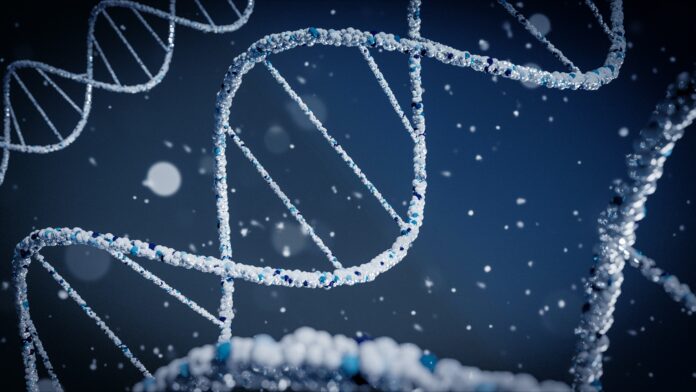DNA, or deoxyribonucleic acid, is a molecule that contains the genetic instructions for the development, functioning, and reproduction of all living organisms. It is often referred to as the “building block of life” due to its crucial role in heredity and the transmission of genetic information from one generation to the next. DNA is found in the nucleus of almost every cell in an organism’s body and is composed of a sequence of nucleotides. Here are ten important things you need to know about DNA:
1. Structure: DNA has a double-helix structure, resembling a twisted ladder or spiral staircase. It consists of two long strands that are made up of sugar-phosphate backbones and connected by pairs of nucleotide bases. The four types of bases found in DNA are adenine (A), thymine (T), cytosine (C), and guanine (G). These bases form complementary pairs: A with T and C with G.
2. Genetic Code: The sequence of nucleotide bases in DNA contains the genetic code, which determines the traits and characteristics of an organism. Each sequence of three bases, known as a codon, codes for a specific amino acid. Amino acids are the building blocks of proteins, and proteins are essential for the structure and function of cells.
3. Replication: DNA undergoes replication to ensure the accurate transmission of genetic information during cell division. During replication, the two strands of DNA separate, and each strand serves as a template for the synthesis of a new complementary strand. This process ensures that each daughter cell receives an identical copy of the parent cell’s DNA.
4. Gene Expression: Genes are specific sequences of DNA that contain the instructions for producing proteins. Gene expression refers to the process by which the information in a gene is used to synthesize a functional protein. It involves two main steps: transcription, where a gene’s DNA sequence is transcribed into messenger RNA (mRNA), and translation, where the mRNA is used as a template to build a protein.
5. Genetic Variation: DNA is subject to mutations, which are changes in the DNA sequence. Mutations can occur spontaneously or be induced by various factors, such as radiation or chemicals. Genetic variations resulting from mutations contribute to the diversity of life and can lead to differences in traits, susceptibility to diseases, and evolutionary changes.
6. Inheritance: DNA is the primary means of inheritance in all living organisms. Offspring inherit half of their DNA from each parent, which is passed on through gametes (sperm and eggs) during sexual reproduction. The combination of genetic material from both parents contributes to the unique characteristics of the offspring.
7. Forensic Science: DNA analysis is a powerful tool in forensic science for identifying individuals and linking them to crime scenes. DNA profiling, also known as DNA fingerprinting, compares specific regions of an individual’s DNA to determine genetic similarities or differences. This technique has revolutionized criminal investigations and played a significant role in solving numerous cases.
8. Genetic Engineering: DNA manipulation techniques have allowed scientists to modify and engineer DNA for various purposes. Genetic engineering involves the insertion, deletion, or modification of specific DNA sequences to introduce desired traits or functions. This field has applications in agriculture, medicine, and industry, such as the development of genetically modified crops, gene therapy, and the production of valuable proteins.
9. Evolutionary Studies: DNA analysis has revolutionized our understanding of evolutionary relationships and the history of life on Earth. By comparing DNA sequences among different species, scientists can reconstruct evolutionary trees and determine the degree of relatedness between organisms. This molecular evidence has provided insights into evolutionary processes, species divergence, and the common ancestry of all life forms.
10. Medical Applications: DNA plays a crucial role in medical research, diagnostics, and treatments. DNA sequencing technologies have advanced significantly, enabling the identification of disease-causing mutations, the detection of genetic predispositions, and personalized medicine approaches. DNA-based tests are used for diagnosing genetic disorders, predicting disease risks, and guiding treatment decisions.
DNA is a double-stranded molecule that contains the genetic code and serves as the blueprint for life. Its structure, replication, and gene expression are fundamental processes that enable the transmission and utilization of genetic information. DNA’s role extends beyond genetics, with applications in forensic science, genetic engineering, evolutionary studies, and medical research. Understanding the intricacies of DNA has revolutionized our knowledge of life, genetics, and the natural world around us.
DNA sequencing technologies have revolutionized medical research, diagnostics, and treatments. By decoding the precise sequence of nucleotides in DNA, scientists can identify specific mutations associated with genetic disorders and diseases. This knowledge allows for early detection and accurate diagnosis of various conditions, enabling prompt medical intervention and treatment.
Furthermore, DNA sequencing plays a vital role in personalized medicine, where treatments are tailored to an individual’s genetic makeup. By analyzing a patient’s DNA, healthcare professionals can determine their genetic predispositions to certain diseases and assess their response to specific medications. This information assists in designing personalized treatment plans that maximize efficacy and minimize adverse effects.
In addition to its medical applications, DNA analysis has made significant contributions to evolutionary studies. By comparing the DNA sequences of different species, scientists can trace their evolutionary relationships and uncover the mechanisms underlying species divergence and adaptation. DNA evidence has provided crucial insights into the common ancestry of all living organisms and shed light on the evolutionary processes that have shaped the biodiversity on our planet.
Forensic science heavily relies on DNA analysis for criminal investigations. DNA profiling techniques, such as short tandem repeat (STR) analysis, examine specific regions of an individual’s DNA to create a unique genetic profile, often referred to as a DNA fingerprint. This profile can be compared to DNA evidence collected from crime scenes to identify potential suspects or establish connections between individuals and specific incidents. DNA analysis has been instrumental in solving numerous criminal cases, exonerating innocent individuals, and ensuring justice.
Genetic engineering represents another significant application of DNA manipulation. By introducing specific DNA sequences into organisms, scientists can modify their genetic makeup and confer desired traits or functions. This technology has revolutionized agriculture, allowing for the development of genetically modified crops with enhanced yield, pest resistance, and nutritional value. In the field of medicine, genetic engineering holds promise for gene therapy, where faulty genes are replaced or repaired to treat genetic disorders. It also facilitates the production of valuable proteins, such as insulin or vaccines, through genetically engineered microorganisms.
Genetic variation resulting from DNA mutations is a natural and essential aspect of life. Mutations contribute to the diversity of species and enable adaptation to changing environments. Some mutations may provide a selective advantage, leading to evolutionary changes and the emergence of new traits. However, certain mutations can also cause genetic diseases or increase the risk of developing certain conditions. Understanding the mechanisms behind genetic mutations is crucial for medical research, genetic counseling, and developing strategies to mitigate the impact of genetic disorders.
The inheritance of DNA from parents to offspring is a fundamental principle of genetics. Offspring inherit half of their DNA from each parent, which is passed on through gametes during sexual reproduction. The combination of genetic material from both parents contributes to the unique characteristics of the offspring. This inheritance process is responsible for the transmission of traits, including physical attributes, susceptibility to diseases, and even behavioral tendencies, from one generation to the next.
In conclusion, DNA is a remarkable molecule that plays a central role in life. Its structure, replication, and gene expression are essential for the transmission and utilization of genetic information. Beyond genetics, DNA analysis has wide-ranging applications in forensics, genetic engineering, evolutionary studies, and medical research. The ability to decode and manipulate DNA has revolutionized our understanding of life, paved the way for personalized medicine, and provided valuable tools for criminal investigations and scientific advancements. DNA continues to be a fascinating and crucial area of study, driving innovations and expanding our knowledge of the intricate mechanisms that underlie the complexity of life.

















